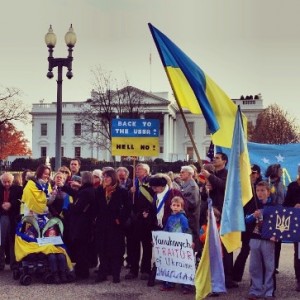
Time to Show Putin the US Means Business in Europe, Literally
The downing of Malaysian Airlines Flight 17 last week over eastern Ukraine, largely suspected to be the work of pro-Russian separatists, represents the culmination of what has now become the most significant rise in East-West tensions since the collapse of the Soviet Union. From the annexation of Crimea to the massing of troops just miles from Ukraine’s eastern border to allegedly providing pro-Russian rebels in Ukraine (who have been described as a “vodka-soaked rabble army” comprised of “thieves, rapists, ex-cons and vandals”) with the military weaponry necessary to shoot down a commercial airliner flying at 33,000 feet, Vladimir Putin and Russia have made it crystal clear just how little regard they have for internationally accepted laws and norms. In light of the events that have taken place over the last few months, largely forgotten is how this whole mess began in the first place.
Last November, pro-Russian president Victor Yanukovych spurned a deal to establish closer trade relations with the European Union at the very last minute, instead taking a sweetheart offer from Russia that included a $15 billion loan and a reduction in gas prices. This move set off massive protests in Kiev by citizens eager to move Ukraine out of Russia’s influence, hoping that closer economic relations with Western Europe will improve living standards and weed out the massive corruption endemic in Ukrainian politics. Since November, these protests have blossomed into a veritable civil war over the identity of Ukraine that has the country torn between pro-Europeans in the west and ethnic Russians in the east.

Let’s be clear here; Putin’s opposition to a Ukrainian trade deal with the EU had very little to do with actual trade and economics. Putin’s fear was over the political, social, and cultural ties that are part and parcel of modern free trade agreements. A trade deal with the EU would inevitably shift Ukraine’s center of gravity west and could serve a stepping stone to eventual EU, and possibly even NATO membership. In the 21st century, free trade deals inevitably entail political commitment, and it is for this reason that the US and the EU need to view the Trans-Atlantic Trade and Investment Partnership (TTIP) as more than a trade pact, but as a powerful tool that can check Russian aggression.
Over the last few years at NATO meetings, Baltic countries with large populations of ethnic Russians including Estonia and Latvia have voiced their concerns over Russia and its revisionist intentions. While it is difficult to place blame on US leaders for rolling their eyes at these claims until recent months, it is now essential that we show solidarity with our threatened NATO allies. TTIP is a low cost way to show Russia that our commitment to European security is as strong as it was during the Cold War and will undoubtedly weigh heavily on the mind of Putin in any cost-benefit calculation for future aggressive behavior.
After World War II, the US propped up a war-torn European economy through the Marshall Plan and the establishment of institutions that guide economic relations between countries in recognition of the political turmoil that arose out of the Great Depression. The miraculous rebound of the European economy fed back to the US and enabled it to become the economic giant we are today. After the recent global financial crisis and subsequent European debt crisis, the US and EU need to keep in mind the historical success of trans-Atlantic economic cooperation that has the potential not only to bolster growth, but to directly feed back into the political and security realms.
The US needs to do everything in its power to signal to Putin that it is serious about its NATO security commitments, particularly to those countries with large populations of ethnic Russians where his sights might be shifting- Lithuania, Estonia, and Latvia all come to mind. TTIP would entangle the economies of the US and these threatened states and serve as deterrence for expanded aggression on the part of Russia. Exerting this type of economic soft power will greatly enhance US influence around the globe as nations see the political and security benefits that go along with embracing free market values.
With TTIP, the US and Europe have the chance to write the rules on how to respond to 21st century economic concerns; obstacles to foreign investment, banking regulations, intellectual property rights laws, and internet privacy all require new and innovative solutions. Coming out of the uncertainty and devastation of World War II, both sides of the Atlantic embraced the opportunity to address pressing economic problems. In 2014 we can only hope they will do the same. It just might stop Vladimir Putin in his tracks.






[…] Time to Show Putin the US Means Business in Europe, Literally […]